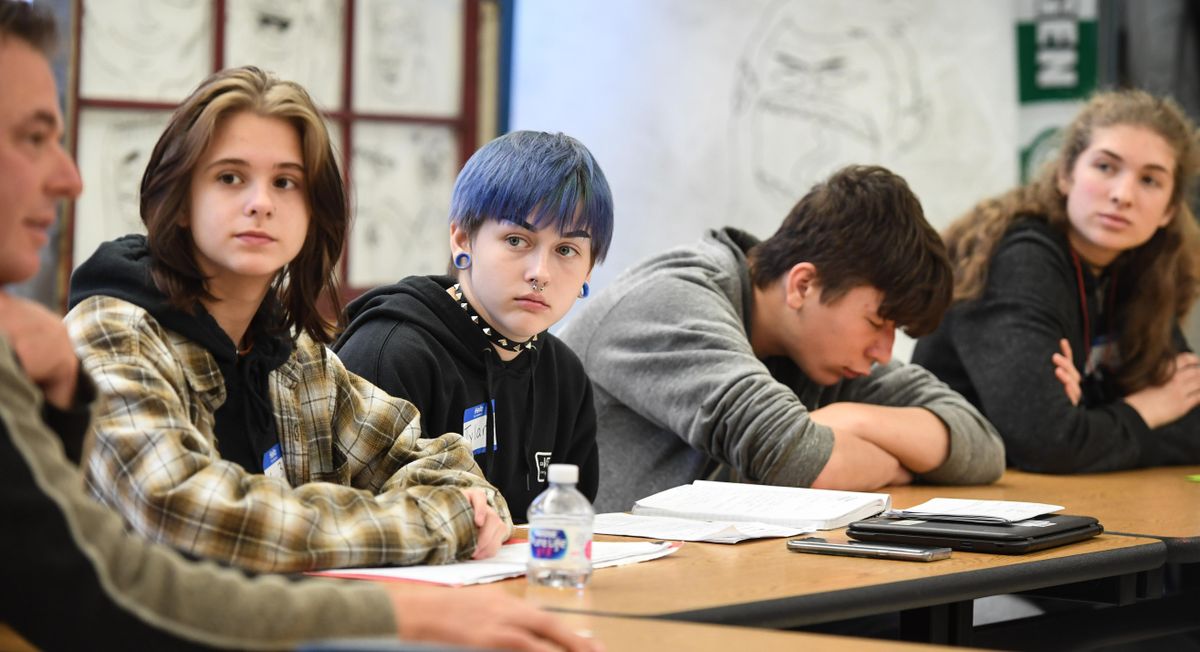Spokane high school students leave hate out of politics project

The young people of Spokane talked politics this week, and they managed to do it without a trace of nastiness.
That may be a surprise to adults, but not to the students at The Community School on North Monroe.
“A lot of people are stuck in their own views and don’t really want to be open to the other side,” said Jason Powell, a senior at the school.
“I’m trying to stay away from that environment and keep my mind open. There aren’t a lot of people like that, but there should be,” said Powell, who just turned 18 and will be casting his first vote this year.
The event was “My Vote, My Voice,” a collaborative effort by the upper classmen at The Community School, a project-based high school that has won awards for just this kind of event.
“If the student is going to be an aware and responsible voter, they have to learn about the issues and candidates,” principal Cindy McMahon said.
After weeks of research, about 60 participants moved from room to room. Discussion centered on the Nov. 6 election, including national and local races, statewide initiatives, and even the pros and cons of voting.
“The students looked at the whole ballot and then researched – we really get deep into the process,” said teacher Dave Egly, who’s led this exercise since 2012.
“It’s cool to hear 18-year-olds get excited about this,” Egly said.
In Room 114, the topic was the 5th District House race between Republican incumbent Cathy McMorris Rodgers and Democratic challenger Lisa Brown.
After introductions and a brief summary of the candidates’ résumés, opinions were served with coffee, donuts and juice, but not a bit of bile.
That doesn’t mean teens are uninformed. A discussion of the congressional candidates quickly moved toward their respective positions on abortion, and whether Planned Parenthood should receive federal funding.
“These are important issues,” said student Madison Bertle.
The students were divided on the candidates, but spoke with one voice on the divisiveness of today’s political scene. For that they blamed social media, mainstream media and the candidates themselves.
Brown and McMorris Rodgers have spent almost $10 million on advertising so far, much of it on negative television commercials. Teenagers have noticed, and they’re not impressed.
“When I see a person running for office and they’re talking bad about the other candidate, that’s off-putting,” said Jeremy Tait, a junior. “It almost makes me like that candidate less.”
That led to the first disagreement: some thought Brown was going too far with negative ads; others believed McMorris Rodgers was the bigger offender.
Either way, contended junior Julia Fritz, “their point isn’t to educate – it’s just to get into your head, ‘That the person is bad, so don’t vote for that person.’ ”
“They never really bring up context,” Fritz complained.
Students said that their political views are partly shaped by their families, but they want to learn more.
Information is everywhere, but it’s often unhelpful, teens have discovered. Already, many have written off Fox News as a Republican mouthpiece and CNN as a Democratic tool, according to Fritz.
Social media is even worse, Tait said, because it encourages groupthink.
“I feel like with social media … we’ve closed ourselves off from any other opinion,” Tait said. “You just have a bunch of people confirming each others’ opinions, and that’s carried into our real world.”
McMahon watched the event like a proud parent.
“Overall, high school people are pretty good at listening to another viewpoint,” she said.